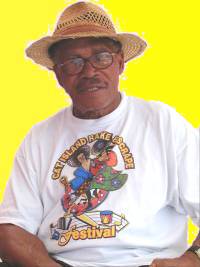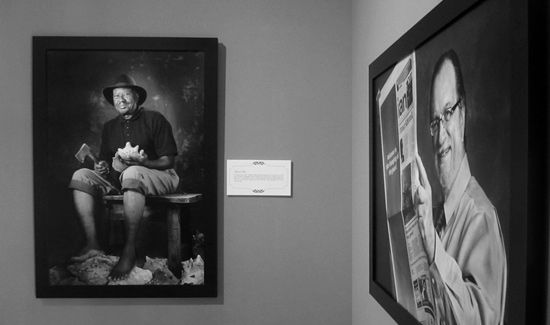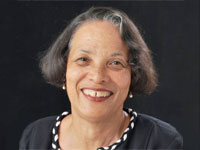 On December 2, 2013, I celebrated my 80th birthday with much gratitude. Having reached such an important milestone, I paused to reflect on my youthful days when I became a part of an organization dedicated to the struggle for social justice.
On December 2, 2013, I celebrated my 80th birthday with much gratitude. Having reached such an important milestone, I paused to reflect on my youthful days when I became a part of an organization dedicated to the struggle for social justice.
Today, my soul mourns the social, economic and political state of the nation and I must conclude that we have travelled from slavery to slavery. We have to agree that something is drastically wrong in our nation and we must unite to seek an effective remedy.
My struggle on the battlefield was rough and sometimes disappointing. However, I remained steadfast and focused in my resolve to preserve democracy. Recently, I was shocked and disappointed in the minister of tourism regarding his revelation of the intention to establish a gaming mecca in The Bahamas. Our forefathers must be in misery as they turn over in their graves. My, my, what a serious departure from our heritage culture and the things we fought for not so long ago. Questions about who should get the next casino license and the establishment of a gambling economy should be cause for serious reflection by all Bahamians.
I vividly recall that in March, 1972 I was informed that Cabinet was to develop a green paper on independence. A green paper is a working document that is sent to Parliament for further development of a final document called a white paper. I was elated because this meant that we were continuing to uphold the primary underpinnings upon which our election rested. My joy quickly vanished when I found out that the venue for the national conference was to be the casino theater on Paradise Island.
I immediately sought an audience with the prime minister to find out what was the reasoning behind his decision to discuss and develop independence for a nation in a casino theater. The prime minister confirmed that the casino was the intended venue and bluntly told me that if I had a better location to suggest he would accept that location. I accepted the challenge and within days identified Harold Road Auditorium (A.F. Adderley School gym) located over the hill. The prime minister accepted the Over-the-Hill location and fortunately the conference was opened on April 15, 1972.
This conference was indeed symbolic because we created a mock parliament setting up the auditorium like the House of Assembly. We borrowed the paraphernalia from the House, including the mace, and constructed a replica of the House over the hill.
It was a national event and it seemed like everybody attended. In attendance were social and cultural organizations, a delegation from every Family Island, unionists, taxi drivers and persons from all walks of life. It was a historic event and we were able to openly discuss and share our views on what we thought an independent Bahamas should be. The official opposition members refused to attend the meeting because they felt as if we should not have created a mock Parliament over the hill and while they believed in independence they did not believe that we were ready for it in 1973.
The opening of the mock Parliament took the form of the official opening of Parliament held in Parliament Square today. During the meeting we were able to develop the green paper and place the completed draft of the proposed format on the prime minister’s desk. It was sent to Parliament in the fall of 1972 and a date was set in January 1973 for independence on July 10, 1973.
Transitioning and Gambling
On December 12, 1973, there was a serious rift within the Progressive Liberal Party (PLP) and the government over casino operations and ownership in The Bahamas. I recall the nasty confrontation between former Minister of Development the late Carlton Francis and the former Minister of Finance A.D. Hanna. It was truly a rude awakening for those present. The confrontation came about because of the critical position taken against the United Bahamian Party in 1967 by the PLP. As a matter of fact, the PLP waged a vicious campaign against casino gambling and the mafia bosses during the 1967 campaign which led to majority rule. It was unthinkable to many of us that the government would want to form a partnership with the mafia group that we campaigned so vehemently against after winning the government. We must not forget the remarks made by Francis that day on the floor of Parliament in connection with the government’s plan to take over the casinos in The Bahamas. Francis, who was also perceived to be speaking on behalf of the Baptist Convention, stated the following, “I am making it clear that as far as I am concerned this is a conscience matter. This resolution raises a fundamental question for me. I am making a clear divergence between my principles and political considerations. Leaving conscience aside, I would like to raise the point that we are a young nation. We have not yet found a national identity. I feel that the white paper (on independence) and the speech from the throne put before us certain ideals and qualities that I would like to see in a young and growing nation. Gambling is a cancer eating away at the qualities that help to make people what they are. I believe there are alternatives, but no one will find these alternatives as long as they can find the easy way out. I do not believe that gambling is good for the country.”
Francis was forced to resign as minister of development and it is my opinion that his reaction was brought about by the behavior of Hanna. Further, I found it difficult to understand why the prime minister seemed eager to let his most able minister go and demonstrated no compassion or sympathy for him. Francis’ removal from the Cabinet table created a void that was difficult to fill.
Some 41 years ago, our government seemed hellbent on lying in bed with casino operators and today nothing has changed. The mission of the Quiet Revolution has been betrayed.
On January 26, 1974, I made the following statement at the First Annual Conference of the Coconut Grove constituency, “The introduction in this country of an economy based on organized gambling will surely destroy our cultural heritage.”
Today, 40 years later, I stand by that statement and call upon the nation to take a stand. We do not need any more casinos in The Bahamas. I humbly beg the government to reconsider its present position. We all know that there are alternatives, but we refuse to explore them. We must act now and we must be creative.
Community Development
I was first elected to Parliament on Tuesday, January 10, 1967 to represent the Coconut Grove constituency. I soon found out that the Progressive Liberal Party government inherited a system of oppression and had no intention of changing it. I called my constituents together and we decided to seek help to embark on a social, cultural and economic development program. The program was a success and to our credit the constituents of Coconut Grove gained a community center, Jumbey Festival, and Jumbey Village on Blue Hill Road. I recall our first classical and folklore concert on March 9, 1969 at the Government High School Auditorium. The Rt. Hon. L.O. Pindling attended the concert and expressed surprise and shock at the talents displayed by our young people from the Coconut Grove constituency.
Shortly after this concert, the prime minister invited me to his residence for a talk and congratulated me for the work that I was doing in the community and invited me to become a parliamentary secretary in his office with responsibilities for community development known these days as Urban Renewal. I accepted the post and received my instrument of appointment in December 1970.
I arrived at the prime minister’s office in January 1971 to receive instructions and was shown a nine by 12 office in the Cabinet building very near the prime minister’s office and instructed to set up the community development program from there. I expressed some concern about the space I was offered and was informed that it was the only space available. I sought some assistance from Carlton Francis, minister of finance, and with his help I was able to set up satisfactory machinery on the second floor of the Spotless Cleaners Building on Madeira Street.
I was eager to get started and immediately contacted the community development unit of the United Nations requesting assistance in the development of a community development program. An officer from the United Nations was dispatched to Nassau to assist us and we developed a program for The Bahamas. On September 15, 1971, I wrote to the prime minister expressing my frustration and disappointment in the government’s attitude towards social problems in the country. The following is an excerpt from that letter, “Our educational system is nearly up to par at present, however, we must remember that we took this country over just four short years ago and all who voted for us at that time are now in the cold and in need of social development machinery. Immediate steps should be taken: To improve and build the minds of the masses in Over-the-Hill areas like Grants Town, Bain Town, the Five Pound Lot etc. and to develop a program that will allow our people to further participate in the economy of the country. Then and only then will we be able to say that we represent all our brothers and sisters.”
In October 1971, I presented that community development program to the Progressive Liberal Party’s convention and it was unanimously adopted by the convention.
The Coconut Grove Community Centre was an ambitious venture but the residents of the Coconut Grove constituency and their member of Parliament rose to the task undauntedly. The community library and clinic, preschool, cultural workshops and a small theater were a part of a self-help project. This was the first time that a member of Parliament had personally done something so significant in his constituency. The first fundraiser, a telethon, was held on Sunday, June 15, 1969. We received pledges of donations in the sum of $10,000 and donations of labor and material. In October 1972, we delivered to the government of The Bahamas two complete units, namely the community clinic and library, which are still in operation today. Both units, which are located on Acklins Street, were fully equipped and professionally staffed, putting in operation the first of its kind over the hill. It may be interesting to note that the clinic served women and infants from as far away as Gladstone and Carmichael Roads. The pre-school unit was completed at a later date and that too is still in operation today.
Cabinet initially agreed to provide funds for the completion of the center, the cultural workshops and small theater with a seating capacity of 200, but later we were denied by the powers that be. God knows I tried. The theater on Acklins Street was to be a training ground for artists, an opportunity for them to sharpen their skills and talents before they performed at Jumbey Village Theatre, which was likened to Carnegie Hall.
Every year we constructed a site for the four-day street festival on Coconut Grove Avenue called the Jumbey Festival, which brought thousands of persons in to the Coconut Grove community to experience indigenous Bahamian culture and way of life. The site included a replica of a typical Bahamian village. It was a strenuous task having to build and take down the site every year and I recognized that eventually we had to develop a permanent site.
In 1970 I had a vision for a cultural center, Jumbey Village. I knew that through self-reliance and self-help, we could produce life from a former dumpsite on Big Pond to create and construct a beautiful heritage village. In 1970 our Jumbey Festival on Coconut Grove Avenue provided the financing to begin land clearing at Big Pond. I was able to get the entire community involved. The proposed Jumbey Village was a three-prong mission: social, cultural and economic. Donations came in the form of monies, trees, trucks and delivery drivers, to name a few items.
The Coconut Grove Women’s Charity Club, Junior Jaycees, Southern Youth Corporation, College UNICOMM, churches and the nation’s schools, private and public, all played a major role in the development of the Village, as it was called.
The junior and secondary schools had a function and the proceeds were donated and the teachers donated a half day’s pay towards the Bahamian people’s Jumbey Village. Dame Doris Johnson, then minister of transport, and Livingstone Coakley, then minister of works, provided assistance in materials and equipment.
By: Edmund Moxey – a former member of Parliament.


